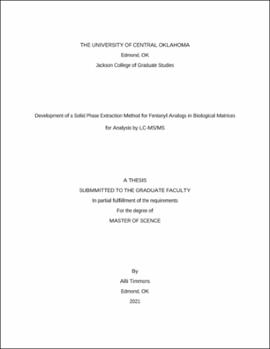| dc.contributor.advisor | Jourdan, Thomas H. | |
| dc.contributor.author | Timmons, Alli | |
| dc.date.accessioned | 2022-02-18T16:10:33Z | |
| dc.date.available | 2022-02-18T16:10:33Z | |
| dc.date.issued | 2021 | |
| dc.identifier.other | (AlmaMMSId)9982823493302196 | |
| dc.identifier.uri | https://hdl.handle.net/11244/334645 | |
| dc.description.abstract | To combat the looming Opioid Crisis, the federal government has allotted funds to local and state law enforcement laboratories to research methods to incorporate emerging opioids into their reporting capabilities. Fentanyl and its analogs (fentalogs) are the most significant threat amongst these compounds, with some having many hundreds to thousands of times the strength of morphine. Because of their immense potency, more and more sensitive methods are needed for their detection. The Oklahoma State Bureau of Investigation (OSBI) has invested in the validation of a more robust solid-phase extraction (SPE) method to improve their current capabilities, as well as expand them. Several fentanyl analogs were chosen from an extensive review of the literature to determine which are most prevalent. In addition to two isotopically labeled internal standards, 14 compounds including parent fentanyl were developed into a new liquid chromatography tandem mass spectrometry (LC-MS/MS) method. This method was validated for whole blood and urine matrices. The validation was performed in compliance with ISO/IEC 17025:2017, ANAB standards and guidelines, and the current OSBI Toxicology Unit Quality Manual. It was overseen by the current Toxicology Technical Manager (TM) and managed by the OSBI Forensic Science Center (FSC) Quality Manager. It was successfully validated following the completion of five studies: interference, carry over, ion suppression/enhancement, limit of detection, and stability. Once brought online, this method will be used in toxicology casework. If a sample screens presumptively positive for fentanyl-related compounds, this method will be used for confirmation testing. Given the success with which this method was validated, more of the current liquid-liquid extractions, such as that for benzodiazepines, will likely be converted to the new SPE paradigm in the future. | en_US |
| dc.rights | All rights reserved by the author, who has granted UCO Chambers Library the non-exclusive right to share this material in its online repositories. Contact UCO Chambers Library's Digital Initiatives Working Group at diwg@uco.edu for the permission policy on the use, reproduction or distribution of this material. | |
| dc.subject.lcsh | Designer drugs | |
| dc.subject.lcsh | Narcotics | |
| dc.subject.lcsh | Forensic toxicology | |
| dc.subject.lcsh | Extraction (Chemistry) | |
| dc.subject.lcsh | Solid-phase analysis | |
| dc.subject.lcsh | Drug control | |
| dc.title | Development of a solid phase extraction method for fentanyl analogs in biological matrices for analysis by LC-MS/MS | en_US |
| dc.type | Academic theses | |
| dc.contributor.committeeMember | Creecy, James | |
| dc.contributor.committeeMember | Gamagedara, Sanjeewa | |
| dc.contributor.committeeMember | New, Dallas | |
| dc.thesis.degree | M.S., Forensic Science | |
| dc.subject.keywords | LC-MS/MS | |
| dc.subject.keywords | Fentanyl analogs | |
| dc.subject.keywords | Forensic | |
| dc.subject.keywords | Solid phase extraction | |
| dc.subject.keywords | Toxicology | |
| dc.subject.keywords | Validation | |
| dc.identifier.oclc | (OCoLC)1308978310 | |
| thesis.degree.grantor | Jackson College of Graduate Studies | |
